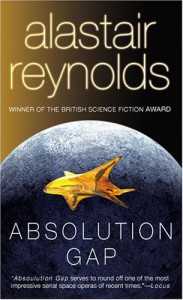Cecily's book reviews
In general I've written reviews of every book I've read since I joined GoodReads (RIP) in May 08, along with one or two I read prior to that. More recent reviews tend to be longer (sometimes a tad too long?).
I always carry a book, though I don't get as much time as I'd like to get engrossed - life is busy, but in a good way.
Too many of my favourite authors died without writing enough!
Apart from reading, and writing about reading, I enjoy Scrabble, good restaurants, woodland, and attending the theatre.
 The third in the Revelation Space series, picking up where Redemption Ark left off. I have been impressed by all the Reynolds I have read, but around the half-way mark, this one was struggling to be worth 3*. However, it redeemed itself in the last quarter, to deserve 4*.
The third in the Revelation Space series, picking up where Redemption Ark left off. I have been impressed by all the Reynolds I have read, but around the half-way mark, this one was struggling to be worth 3*. However, it redeemed itself in the last quarter, to deserve 4*.Like many of Reynolds' books, this is a story with three main, interrelated, strands, though it is simpler than the previous two Revelation Space volumes - or perhaps that is just because there are so many familiar characters and fewer new ones.
On strand is on the Juggler planet, Ararat, where Clavain, Scorpio and others ended up in Redemption Ark. A second strand concerns ultras looking for alien relics, though this one joins with one of the others about half way through. The third focuses on a moon called Hela, which is home to humans, many of whom follow (in a literal sense) a cultish religion trying to observe the occasional fleeting disappearance of their sun, Haldora.
The book is plot-driven, rather than character-based, as is common with sci fi, and that is fine - until the plot stagnates, which was what I found in the middle: it became mired in too much detail of church hierarchies and infighting, without enough happening, and not even balanced by much character development. A decent editor would fix that, but perhaps Reynolds is too successful for his own good and does not need to submit to such indignities. Anyway, I'm glad I stuck with it; in the end it was definitely worth the ride.
The church caravans are rather steampunky (shades of Mortal Engines), which doesn't feel very Reynoldsy, and their obsession with blood sometimes brings vampires to mind - "the threads of blood that bound them all". Mind you, I did like the fact that the most powerful indoctrinal virus was called Deus-X.
The main themes are the related ones of life, death, extreme longevity, faith, artificial intelligence, and the nature of reality.
Imagine what it must be like to know your belief comes from virus: "the feelings it brought were too superficial... He truly felt himself to be in the presence of something sacred, but he also knew, with total clarity, that this was due to neuro-anatomy."
Reefersleep coupled with life extension becomes almost like time travel: "'I wasn't made for these times', he thought. He had been yanked from the ordinary flow of time and now he was adrift, unmoored from history." And that sort of thing affects one's attitude to mortality, "In every significant respect he approached the matter of his own demise with the bored acceptance of someone waiting to sneeze."
Technology does offer compensation, though: "The ship nurtured him, anticipating his desires with the eagerness of a courtesan... because the ship knew him so well,m he had in a sense extended himself into it."
Despite the distractions and imperfections, this does conclude the trilogy in a satisfying way, building on what has gone before as well as introducing new themes.




